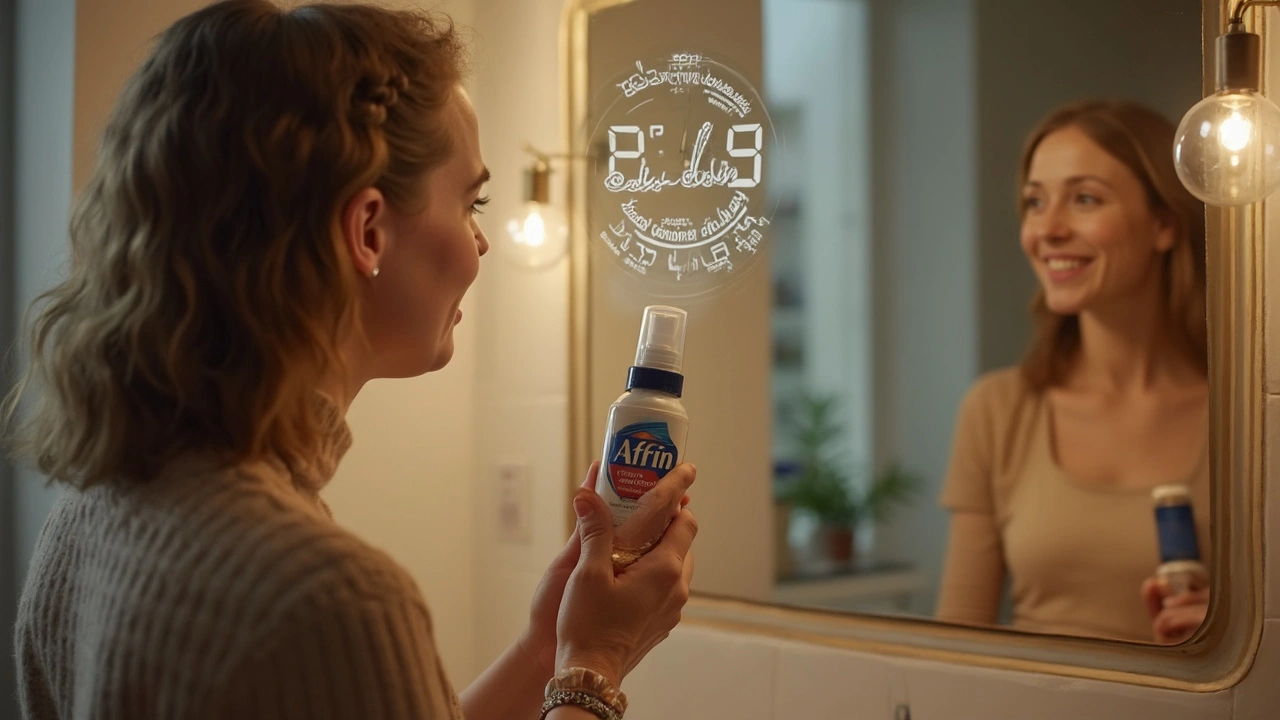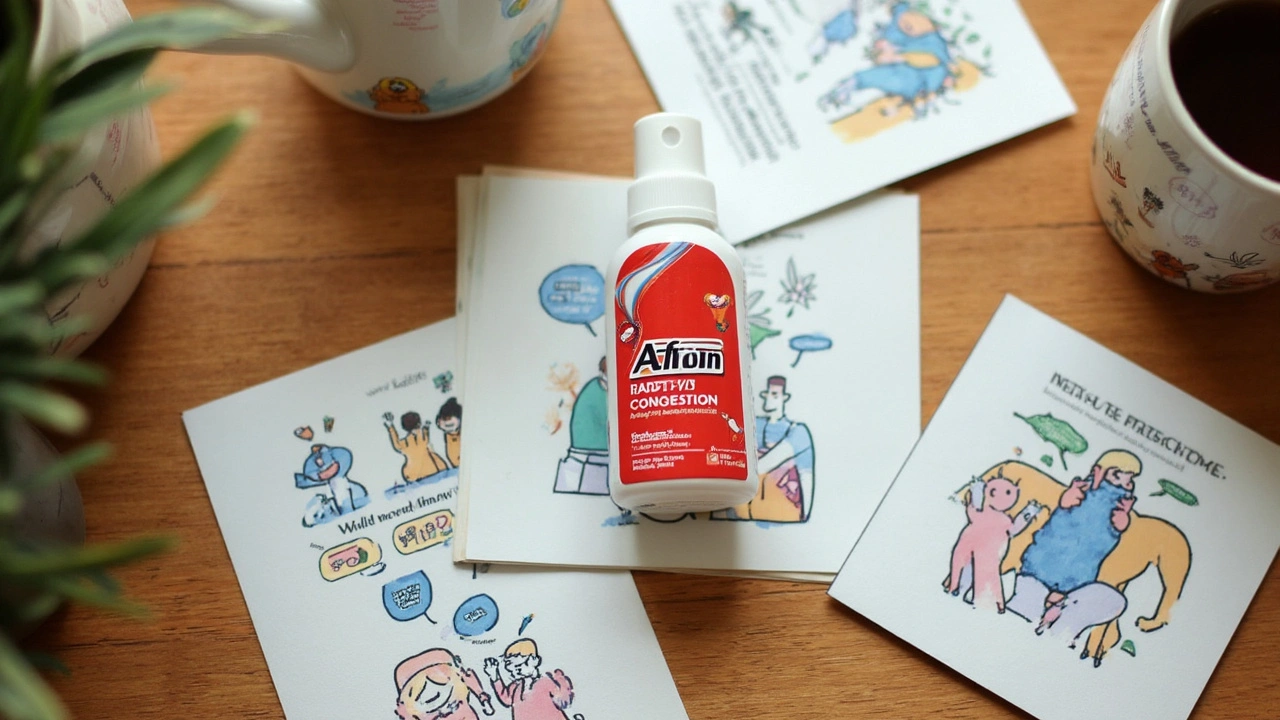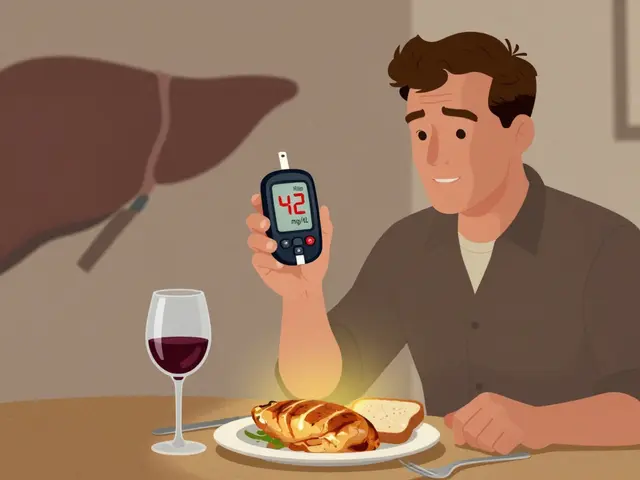How Does Afrin Work—and When Does It Start Causing Trouble?
If you've ever reached for a bottle of Afrin, odds are your nose was turned into a brick wall. This little spray—containing oxymetazoline—is the go-to fix for clogged sinuses, especially during cold and allergy season. What makes Afrin impressive is how fast it works. You spray it, and suddenly, you can breathe out of nostrils you forgot you had. The reason? Oxymetazoline shrinks the blood vessels inside your nasal passages. When things swell up due to allergies or infection, blood vessels get big and puffy, squashing your airways. Oxymetazoline tells those vessels to tighten up, opening your nose back up like unclogging a drain.
But Afrin’s magic is a double-edged sword. Use it for a day or two, and you’ll probably be singing its praises. Use it a few days longer, though, and things can go sideways fast. Your nose starts to rely on it—and that’s where rebound congestion comes in. It’s like borrowing money from a payday lender: feels great in the moment, but payback is rough. Your nasal tissues can start to swell even more, making you need more and more spray just to feel normal. This cycle traps a lot of folks, often without them realizing what's happening until they're looking up terms like "Afrin addiction." Never heard of that? There are stories of people using it for months, not just days, and ending up worse off than when they started. That's not just uncomfortable—it's a real risk to your health.
What Is the Right Afrin Dosage—and What Happens If You Go Over?
Let’s get real about dosing. The bottle isn’t being overly dramatic with its instructions. Most Afrin products say: two or three sprays per nostril, every 10 to 12 hours. That’s MAX. Don't let impatience trick you into thinking, "just a quick bonus spray"—your nose notices, even if you don't. The "no more than twice a day" rule is there because overusing Afrin can soak your nasal tissues and ramp up the risk of side effects like burning, stinging, and especially rebound congestion.
Here's something worth knowing: studies show people often go above dosing guidelines, especially at night when clogged noses make sleep impossible. One analysis from the American Rhinologic Society looked at nasal decongestant misuse and found more than 50% of surveyed patients used their spray more than recommended. Tempting, but dangerous. Go past those dosing limits and you increase chances of nosebleeds, headaches, fast heartbeats, and anxiety.
Below is a handy overview of common Afrin dosing limits:
| Age Group | Recommended Max Dosage | Frequency |
|---|---|---|
| Adults & children 6yrs+ | 2-3 sprays per nostril | Every 10-12 hours |
| Children under 6 | Not recommended | Consult doctor |
If you do overshoot, don’t panic—but don’t keep spraying, either. Fast heart rate, high blood pressure, and anxiety are all warning signs to look for in case of an Afrin overdose—rare, but real. If you notice these symptoms, especially if you've used a lot, get medical help. The bottom line—count your sprays.

Rebound Congestion: Why Your Nose Gets Worse After Afrin
The term "rebound congestion" sounds like something out of a sports playbook, but in reality, it's just a simple trick your nose pulls on you. When you take Afrin longer than three days, your nasal tissues can become dependent on the medication. Here’s the cycle: oxymetazoline clamps down blood vessels, but when it wears off, those same vessels react by swelling up even more than before. Each time you reapply the spray, it brings things back to normal, but only as long as you keep using it. This is why folks often say their stuffy nose returns stronger than ever if they miss a dose after several days of Afrin.
Doctors actually have a special name for the problem: rhinitis medicamentosa. It can sneak up on people. You may not even notice the congestion worsening at first. Day by day, you need more spray and get less relief. There are case reports of people using nasal decongestants for months, sometimes years, before realizing they can’t breathe well without them. And it’s not just theory: ENT doctors say they see rebound congestion regularly, especially during allergy season. Even a few days over the recommended 3-day limit can make a difference.
Here’s a tip: if you want to stop rebound congestion, you’ll need to quit Afrin, cold turkey. Not fun, but the only reliable solution. Your nose may be stuffed up for a few days, but then things usually clear up. Some people stagger their use—using just one nostril at a time, or switching to saline sprays for a while. Saline rinses and steam inhalation can help, but time is the real healer here. Think of rebound congestion like caffeine withdrawal for your nose: rough, but temporary. The key lesson? If it says "no more than 3 days," that’s not a suggestion, it’s a hard stop.
Afrin Side Effects and Real Safety Risks to Know
Afrin is safe for most adults... as long as you play by the rules. Still, there are side effects you might see, even on day one: burning, stinging, sneezing, and dryness in the nose are most common. If you’re sensitive, sometimes Afrin can cause headaches, trouble sleeping, or a rapid heartbeat. These might sound mild, but add up over time and they can be annoying or even dangerous. Here’s a fact: using nasal decongestants over the counter is behind around 20% of chronic nasal complaints in ENT clinics, often because people don’t realize these sprays can trigger more trouble than they solve if used long-term.
Certain groups need to be extra cautious. People with high blood pressure, heart problems, diabetes, or thyroid issues should check with a doctor before using Afrin. The reason? Even though the spray works locally, a bit is absorbed into your bloodstream, which can nudge up blood pressure or heart rate, even if just a little. If you’re on any meds for hypertension or taking MAOIs, you should steer clear unless your doctor signs off.
Pregnant? This is a huge question, and there’s no single answer. The safety of Afrin (oxymetazoline) in pregnancy isn't totally nailed down. Research is mixed, but most doctors prefer safer alternatives unless you’re in a real bind. If you’ve ever wondered, "can I take Afrin while pregnant?" the breakdown covers what’s known and how to be safe. For a lot of folks, saline sprays or steam, though less glamorous, beat any risk. And for little kids? Play it extra safe—children under six should never use Afrin unless their pediatrician says so.
If your symptoms last longer than a week, skip self-medicating and go see your doc, because something else could be going on—sinus infections, nasal polyps, or allergies that need proper treatment.

Tips for Using Afrin Without Getting Hooked
You want relief without the backlash. So what’s the trick? Here’s a bulletproof game plan for using Afrin right:
- Set a hard limit— Mark your calendar for no more than three days. If you feel tempted to push it, remind yourself about rebound congestion.
- Try a saline spray first— It sounds unexciting, but saline rinses (think of like NeilMed or Neti-Pot) actually clear out gunk without any rebound risk. Use them before reaching for the heavy stuff.
- Spray only when you’re desperate— Save Afrin for nights when you truly can’t sleep or for moments when you have to function. The less you use, the safer you’ll be.
- Alternate nostrils— If you must stretch out use, some ear, nose, and throat doctors suggest only spraying one nostril at a time. Let the other recover, switch after a couple of days. It's not a perfect fix, but it can make quitting easier later on.
- Never double down— If you miss a dose, do NOT use two next time. Just wait for the next scheduled moment, or skip it altogether.
- Hydrate— Drinking water can help keep your nasal passages moist and less irritated.
- Use gentle technique— Don’t jam the tip of the bottle up your nose. Aim for a gentle spray against the outer wall of your nostril. A hard blast straight up can hurt sensitive tissues, making damage or side effects more likely.
And here’s a human tip: Tell someone you trust that you’re using it, especially if you have a history of getting stuck on over-the-counter meds. A buddy system works wonders for accountability.
If you find yourself coming back to Afrin again and again, it might be time to get your allergies or sinus problems checked out. You could be missing an underlying cause—deviated septum, chronic allergies, or even sleep apnea.







Leia not 'your worship'
5 May 2025 - 12:51 PM
Okay but have you ever noticed how Afrin feels like a emotional support drug? Like, you're not just clearing your nose-you're clearing your anxiety too. It's not medicine, it's a tiny dopamine hit disguised as a nasal spray. I've been there. One spray, then another, then... wait, why is my face sweating? Oh right. I'm addicted to breathing. 🤭
It's not the spray that's the problem. It's the fact that we've normalized quick fixes for everything. Sleep? Adderall. Stress? Xanax. Stuffy nose? Afrin. We're a culture of chemical band-aids.
And yet... I still reach for it when I can't sleep. Guilty as charged.
Jo Sta
5 May 2025 - 20:56 PM
Stop coddling Americans with ‘3-day limits.’ If you can’t handle a decongestant without crying, maybe you shouldn’t be breathing through your nose at all. My grandpa used Afrin for six months straight during the ’80s and still ran marathons. You’re weak. Get tough. Or move to Canada where they don’t let you buy aspirin without a license.
KALPESH GANVIR
6 May 2025 - 22:50 PM
I’m from India, and we have this thing called ‘nasya’-Ayurvedic nasal oil therapy. No chemicals, just sesame or coconut oil with a drop of eucalyptus. It doesn’t give you instant relief like Afrin, but it doesn’t wreck your nasal lining either. I switched after a bad rebound case last winter. Took 10 days to feel normal again, but now I don’t fear my own nose.
Also, steam with turmeric and salt? Magic. Not sexy, but real.
April Barrow
7 May 2025 - 14:39 PM
Three days. Not four. Not five. Three. That’s not a suggestion. It’s a biological fact. Your nasal mucosa has receptors that downregulate with prolonged oxymetazoline exposure. That’s not opinion. That’s pharmacology. If you ignore it, you’re not brave-you’re just making your ENT’s job harder.
Melody Jiang
7 May 2025 - 18:22 PM
There’s something deeply human about how we treat our bodies like machines that need reset buttons. Afrin is the reset button for your nose. But you can’t keep pressing it forever. Eventually, the machine forgets how to work without the button.
Maybe the real question isn’t how to use Afrin safely-but why we’ve come to believe we need to ‘fix’ every minor discomfort with a chemical solution. What are we afraid of? Silence? Stillness? The feeling of being slightly uncomfortable?
alex terzarede
8 May 2025 - 13:12 PM
Rebound congestion isn’t ‘addiction.’ It’s pharmacological adaptation. Your body isn’t broken-it’s responding to a stimulus. The solution isn’t shame. It’s tapering. Try one nostril at a time. Use saline between doses. Give your mucosa time to recalibrate. It’s not rocket science. It’s biology.
Dipali patel
8 May 2025 - 20:43 PM
EVERYONE KNOWS AFRIN IS A GOVERNMENT PLOY TO GET YOU DEPENDENT. THE FDA ALLOWS IT BECAUSE PHARMA PAYS THEM. THEY WANT YOU TO BUY MORE SPRAYS. THEY’RE USING YOUR NOSE TO FUND THEIR YACHTS. I SAW A VIDEO ON TIKTOK WHERE A DOCTOR SAID OXYMETAZOLINE IS LINKED TO 5G SIGNALS. I DON’T TRUST ANYTHING THAT HAS A TABLE IN IT.
ALSO MY CAT HATES ME NOW. IS THAT CONNECTED?
Jasmine L
9 May 2025 - 12:50 PM
Saline spray is the OG nasal BFF 😌 I keep a bottle in my purse, my car, my desk drawer. No drama, no guilt, no ‘oh god why is my nose on fire?’ Just clean, quiet relief. And it’s like $7 at Target. Afrin? That’s the toxic ex you keep texting at 2am. Let it go. 💙
lisa zebastian
10 May 2025 - 23:30 PM
They say 3 days. But what if you’re in a ‘high-stress corporate environment’? You need to look presentable. You need to sound clear on Zoom. You need to function. This isn’t about ‘addiction.’ It’s about survival in a system that rewards performance over health. They don’t care if you’re nasal-wired. They just want you to answer the email.
Jessie Bellen
12 May 2025 - 16:17 PM
People who use Afrin longer than 3 days are just lazy. You don’t need a spray. You need a humidifier and a nap. Stop being a baby.
Jasmine Kara
13 May 2025 - 23:28 PM
i used afrin for 2 weeks once bc i had a cold and then my nose was like a brick and i cried for 3 days and now i dont trust my own body. also i think the bottle was expired. idk. but i dont use it anymore. i just sniff.
Richie Lasit
15 May 2025 - 09:40 AM
Look. I get it. You’re tired. You’ve got a presentation tomorrow. Your kid’s got a fever. Your partner’s snoring like a chainsaw. You just need to breathe. I’ve been there. But here’s the thing: you’re not weak for wanting relief. You’re human.
So do this: use Afrin tonight. Just once. Then tomorrow, start saline rinses. Drink water. Sleep with your head elevated. You got this. One day at a time. No shame. Just progress.
arthur ball
15 May 2025 - 14:14 PM
Man. I used Afrin for 11 days straight last year. Didn’t even realize it. Thought I was just ‘really congested.’ Then one morning I woke up and couldn’t breathe through either nostril. Like… full-on silent scream. No spray helped. I had to go to the ENT. He looked at me like I’d just confessed to eating a whole pizza in one sitting.
Three months later, I’m finally back to normal. Saline. Steam. Patience. And a whole new respect for my nasal turbinates. They’re not just… stuff. They’re *alive*.
Harrison Dearing
17 May 2025 - 08:57 AM
Rebound congestion = nasal Stockholm syndrome. You’re held hostage by your own blood vessels. The spray is the kidnapper. You think you love it. You think you need it. But it’s just manipulating you. Break the cycle. Cry for a week. Then breathe like a free person. 🙌
Justice Ward
18 May 2025 - 15:36 PM
Afrin is the literary equivalent of a plot twist in a bad novel. It solves the problem in chapter two, then ruins everything by chapter five. You don’t need a magic bullet-you need a slow, steady, boring solution. Like… water. And sleep. And not breathing through your mouth like a startled fish.
bhuvanesh kankani
20 May 2025 - 05:59 AM
In India, we have a saying: ‘The fastest solution is not always the wisest.’ We use tulsi leaves, steam with ajwain, and nasal irrigation with warm salt water. These are not ‘alternative’ remedies-they are ancestral wisdom. Modern medicine often forgets that healing takes time, not just chemicals. Respect your body’s rhythm.
maria norman
21 May 2025 - 01:24 AM
They say ‘don’t use more than 3 days.’ But let’s be real: the label is just a legal disclaimer. The real reason? If you used it longer, you’d stop buying it. And then the company would go bankrupt. It’s not about safety. It’s about profit margins. The ‘rebound effect’? That’s not a side effect. That’s the business model.
Iris Schaper
23 May 2025 - 01:11 AM
just tried the one nostril thing. weird. like having a nose with a personality. one side is chill, the other is screaming. i think i like it. maybe this is how i’ll quit. slow. one side at a time. no drama. just… breathing.
katerine rose
23 May 2025 - 23:44 PM
if you’re not using afrin daily you’re not living. my nose is my life. i spray before i shower before i work before i sleep. i’m not addicted. i’m optimized. deal with it.
Selma Cey
25 May 2025 - 10:13 AM
What if rebound congestion isn’t the problem? What if the real problem is that we’ve been taught to fear discomfort? Maybe your nose is trying to tell you something. Maybe you need to sit with the stuffiness. Maybe the answer isn’t a spray-it’s silence.